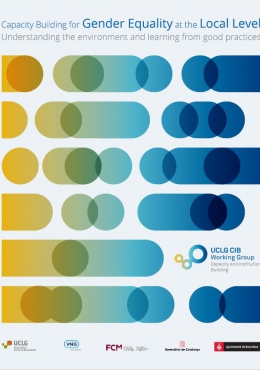Dear readers,
It is our pleasure to hereby send you the fourth CIB newsletter of 2021. Thank you all for your contributions!
On the 23rd of June, the third CIB Webinar on gender was held. This edition of the CIB Webinar focussed on the release of the publication ‘Capacity Building for Gender Equality at the local level: Understanding the environment and learning from good practices’. The CIB Secretariat was very happy to meet many of you at the digital launch of this publication and would like to thank all attendees for their contributions to this event. For those who did not yet read the report, please find it here.
In this newsletter, we also look ahead to the Annual meeting of the UCLG CIB Working Group 2021, which will be held virtually on 12, 13 and 14 October 2021. The exact times and programme have not yet been confirmed, but registration is already open and can be done here. Besides interesting disucssions and exchanges between members of the CIB network, you may expect the latest updates on the UCLG/CIB policy paper on Development Cooperation by Local Governments. With thanks to your valuable input and contributions, the Policy Paper is rapdily starting to take shape. During the CIB Annual Meeting we aim to further discuss and exchange about the local government development cooperation trends identified so far.
Again, many interesting events will be organised in the upcoming months. Don't forget to have a look at CIB's calender from time to time, which is now updated with all events coming up soon.
The next CIB newsletter will be sent out in October - please send your input to uclg.cib@vng.nl. Thank you.
Kind regards,
CIB Working Group secretariat
Stan Abma, Mathijs Kuppen and Koen Geerts
CIB News
UCLG News
Updates by CIB Members
Trainings & Campaigns
News regarding gender equality at local level
Calendar of events
Publications
Early 2020, the CIB Working Group Secretariat started working on a study concerning gender equality at the local level. With this publication we explored how UCLG’s political gender strategy can be included in the many of our projects and programmes. At the same time, we hope the that it provides instruments and tools that will help our members to implement gender strategies in their work. Therefore, we produced a brochure, consisting of guidelines, technical tools as well as twelve case studies, composed to demonstrate how local government development cooperation projects can concretely improve gender equality at both the local and regional level.
How do the Nordic countries and Europe work towards the SDGs? On behalf of KS, Nordregio has carried out a survey of Nordic and European initiatives that are relevant for local and regional authorities to know about in the work towards the UN Sustainable Development Goals. With the report, KS hopes to contribute useful information and expand the toolbox for the work with the SDGs. In recent years, there has been a clear global agreement that the sustainability goals cannot be met without local efforts. Networks and exchange of experiences across national borders and between the Nordic countries can provide new inspiration and new approaches for local sustainability work.
In 2015 the United Nations declared an ambitious programme, the Sustainable Development Goals (SDGs). With similar aspirations to the Universal Declaration of Human Rights in 1948, the SDGs claim is to make a difference in terms of justice and sustainability on a global scale. Both UN frameworks speak to the global imagination, but what do they do in (local) practice(s)? Are the SDGs going to be enough? While current research focuses on the governance aspect of the SDGs and the efficiency of their implementation by national governments, little attention has been paid to the localisation process. Exploring the SDGs as a social imaginary of a moral order (Charles Taylor) and linking this to a framework of ‘localizing human rights’, we determine whether and in what way the SDGs might be a source of inspiration in some pioneering city-initiatives.
















